翻译英语习语应注意的几个问题
英语习语的翻译
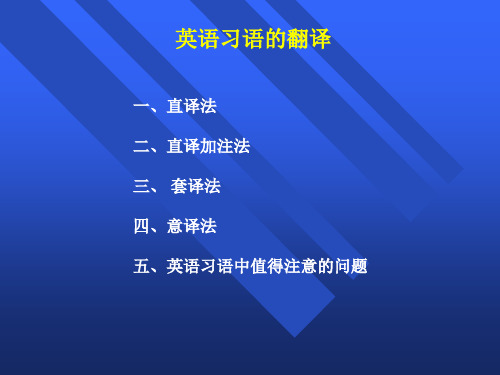
To wash one’s hand
“金盆洗手” 或 “洗手不干” 错! “推卸责任” 或 “断绝关系” 对!
五、英语习语中值得注意的问题
4. 准确理解英语习语, 弄清褒贬之分
It’s an ill wind that blows nobody good “天下无绝对的坏事” 或 “有弊也有利” 看似贬义, 其实是褒义. Birds of a feather flock together “物以类聚” “一丘之貉”
软硬兼施 赚钱养家 糊口 奉承,恭维
小菜一碟
精力充沛
be in apple-pie appleorder Butter would not melt in her mouth. One man’s meat is another man’s poison.
井井有条
装得清白无辜 一本正经
后悔已晚 与某人 有争论 插手, 干预
Hang on somebody’s sleeve To rain cats and dogs Hit the nail on the head A fly on the wheel
To miss the 依赖某人 boat 任某人做主
下倾盆 大雨
In a pig’s eyes
说得中肯, To the tune of 说得中肯, 一语道破 自高自大 的人
扫兴的人 或东西 采取回避 政策
A soldier of fortune
兵痞
Have a bee in one’s bonnet ( 头饰) 头饰) Hang on somebody’s lops To have other fish to fry
胡思乱想
To soil the beans To work hand in glove with
英语翻译十大技巧

英语翻译十大技巧在今天的全球化时代,英语已经成为了一种全球通用语言,无论是在学校、工作场所还是日常生活中,我们都需要使用英语。
而对于许多非英语母语的人来说,翻译成英语可能是一个具有挑战性的任务。
本文将介绍英语翻译的十大技巧,帮助您更好地应对这一任务。
一、理解原文在开始翻译之前,首先要确保对原文有一个清晰的理解。
仔细阅读原文,理解其中的意思、语境以及作者的写作目的。
只有通过深入理解原文,我们才能更好地传达原文中的信息。
二、根据上下文翻译时常我们会遇到一些具有多义性的词语,在翻译时需要根据上下文来进行选择合适的含义。
通过仔细分析句子所处的语境,我们可以更准确地翻译出这些词语的意思。
三、保持简洁明了英语一直以来都以简洁明了著称,翻译时也要尽量保持这种特点。
避免使用过于繁琐的句子结构和冗长的表达方式,保持句子的简洁性,能够使读者更容易理解所要传达的意思。
四、注意语法和拼写正确的语法和拼写是英语翻译中的关键。
犯下语法和拼写错误可能会导致误解和歧义。
要牢记英语的基本语法规则,仔细检查所翻译的内容,确保语法和拼写的正确性。
五、避免直译直译是一个常见的翻译错误。
有时,一个短语或句子在英语中的表达方式与原文完全不同。
在翻译时,应尽量避免直译,而是根据英语的表达习惯和习语来传达原文的含义。
六、了解文化差异英语的使用和表达方式在不同的文化背景下可能会有所不同。
在翻译时,要注意原文所处的文化背景,并尽可能将这种文化差异传达到译文中。
这样可以使译文更贴近原文的意思,同时也更容易被目标读者所理解。
七、重视语气和语调语气和语调在英语中承载了很多信息。
在翻译时,要尽量保留原文中的语气和语调,使译文更贴合原文的情感色彩。
这样可以使读者更加有身临其境的感受,更好地理解原文的意思。
八、遵循译者的道德准则作为翻译者,我们应该遵循译者的道德准则。
这包括尊重原文作者的原意,不添油加醋地篡改原文的含义,以及对译文进行客观和公正的表达。
我们应该始终忠实于原文,并尽力传达原文所要表达的意思。
英语翻译中有什么方法(优秀3篇)
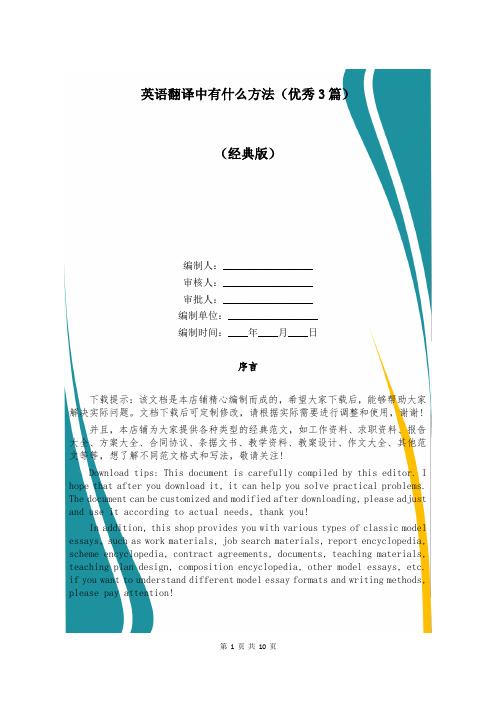
英语翻译中有什么方法(优秀3篇)(经典版)编制人:__________________审核人:__________________审批人:__________________编制单位:__________________编制时间:____年____月____日序言下载提示:该文档是本店铺精心编制而成的,希望大家下载后,能够帮助大家解决实际问题。
文档下载后可定制修改,请根据实际需要进行调整和使用,谢谢!并且,本店铺为大家提供各种类型的经典范文,如工作资料、求职资料、报告大全、方案大全、合同协议、条据文书、教学资料、教案设计、作文大全、其他范文等等,想了解不同范文格式和写法,敬请关注!Download tips: This document is carefully compiled by this editor. I hope that after you download it, it can help you solve practical problems. The document can be customized and modified after downloading, please adjust and use it according to actual needs, thank you!In addition, this shop provides you with various types of classic model essays, such as work materials, job search materials, report encyclopedia, scheme encyclopedia, contract agreements, documents, teaching materials, teaching plan design, composition encyclopedia, other model essays, etc. if you want to understand different model essay formats and writing methods, please pay attention!英语翻译中有什么方法(优秀3篇)英语学习者一般愿做英译汉题目,怕做汉译英题目。
英语习语汉译方法及应注意的问题

译 法 、 译加 注法 和代换法 等五 种 。 直
1 直译法 (i rl rnlt n . 1ea t s i ) t a ao
在 译文 中再现 习语 中的形 象和修 饰 色彩 , 但直 译法 有 很大 的局 限性 。许 多英语 习语 汉译 时 , 若照 字面
意思直 译 , 能 反 映其 蕴 含 意义 , 至 引起 错 误 则不 甚
直译 加 注法 、 换 法等几种 。 代
关 键词 : 英语 习语 ; 文化 差异 ; 翻译 方法
中图分类 号 : 3 5 9 H 1 . 文 献标 识码 : A 文章编 号 :0 9—1 5 f0 0 0 0 0 0 10 7 0 2 1 ) 1— 14— 3
习语是 某一 语 言 在 使用 过 程 中形成 的独 特 的 固定 的表 达方式 , 语 言 中重 要 的修 辞 手 段 , 是 同时
、
英语 习语汉 译 的主 要 方法
t w a enht 戴 绿 帽 子 o elag e a r
英语 习语汉 译 方法 主要有 : 直译 法 、 意译 法 、 套
2 意译法 (ret nlt n . f as i ) e r ao 直 译法保 留了原文 的表达方 式 , 能最大 限度地
第2 9卷第 1 期 郑州航 空工业管理学 院学报 ( 社会科学版 ) 21 0 0年 2月 Ju a o hnzo ntu f e nui l nut aae etS c cec dtn orl f eghuIstt o r at a Id syM ngm n(oi Si eE io ) n Z ie A o c r l a n i
不 同语 言的文化 差异 , 使得 英汉 习语概 念在诸 多方面有所 不 同。英语 习语翻 译成英 语 时, 最重要 的是要 保证 原 文 隐含 意义 的准确 转 达和 习语 的语 用 效果 , 没有 文 化 冲 突 在
高中英语翻译中的习语与俚语翻译技巧

高中英语翻译中的习语与俚语翻译技巧在高中英语学习中,我们经常会遇到一些习语和俚语,这些表达方式丰富了语言的多样性,但同时也给翻译带来了一定的难度。
在翻译习语和俚语时,我们需要注意一些技巧,以确保翻译的准确性和流畅性。
首先,我们需要了解习语和俚语的含义。
习语和俚语通常是一种特定的表达方式,其意义可能与字面意思相去甚远。
因此,在翻译时,我们不能简单地根据字面意思进行翻译,而是要理解其隐含的含义。
其次,我们需要考虑习语和俚语在不同文化背景下的差异。
同一种语言的习语和俚语在不同地区可能有不同的表达方式。
因此,在翻译时,我们需要根据目标语言的文化背景选择合适的翻译方式,以确保目标读者能够理解。
另外,我们需要注意习语和俚语的语言风格。
习语和俚语通常具有一定的口语化特点,因此在翻译时,我们可以使用一些与口语相近的表达方式,以更好地传达原文的意思。
此外,我们还可以利用上下文来解释习语和俚语的含义。
有时候,习语和俚语的意思可能并不明确,但通过上下文的分析,我们可以推断出其大致的含义。
因此,在翻译时,我们可以根据上下文选择合适的翻译方式。
另一个需要注意的问题是习语和俚语的字面翻译可能会导致误解。
有些习语和俚语在字面意义上可能是荒谬的,但在特定的语境中却能够传达出一定的意义。
因此,在翻译时,我们需要避免过于依赖字面翻译,而是要根据整个句子的意思进行翻译。
此外,我们还可以利用类似的习语和俚语进行翻译。
有时候,我们可能无法找到与原文完全相符的翻译方式,但我们可以选择与之意思相近的习语和俚语进行翻译。
这样做可以在一定程度上保持原文的意思,并且使翻译更加流畅。
最后,我们需要不断学习和积累习语和俚语的知识。
习语和俚语是语言的一部分,它们反映了语言所处的文化背景和社会环境。
因此,我们需要通过阅读和交流来了解和掌握更多的习语和俚语,以便在翻译时更加准确地传达原文的意思。
总之,高中英语翻译中的习语和俚语翻译技巧需要我们理解其含义,考虑文化差异,注意语言风格,利用上下文解释,避免字面翻译误解,使用类似的习语和俚语,并不断学习和积累知识。
英语学习中的常见翻译错误及其纠正方法
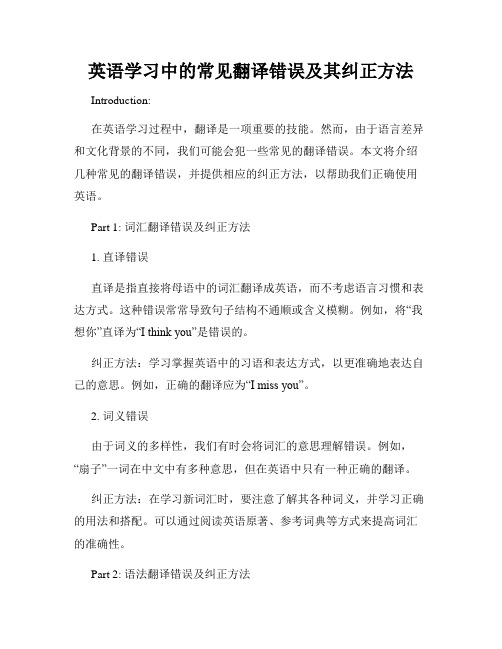
英语学习中的常见翻译错误及其纠正方法Introduction:在英语学习过程中,翻译是一项重要的技能。
然而,由于语言差异和文化背景的不同,我们可能会犯一些常见的翻译错误。
本文将介绍几种常见的翻译错误,并提供相应的纠正方法,以帮助我们正确使用英语。
Part 1: 词汇翻译错误及纠正方法1. 直译错误直译是指直接将母语中的词汇翻译成英语,而不考虑语言习惯和表达方式。
这种错误常常导致句子结构不通顺或含义模糊。
例如,将“我想你”直译为“I think you”是错误的。
纠正方法:学习掌握英语中的习语和表达方式,以更准确地表达自己的意思。
例如,正确的翻译应为“I miss you”。
2. 词义错误由于词义的多样性,我们有时会将词汇的意思理解错误。
例如,“扇子”一词在中文中有多种意思,但在英语中只有一种正确的翻译。
纠正方法:在学习新词汇时,要注意了解其各种词义,并学习正确的用法和搭配。
可以通过阅读英语原著、参考词典等方式来提高词汇的准确性。
Part 2: 语法翻译错误及纠正方法1. 时态错误时态是英语中重要的语法要点之一,但由于语言习惯的不同,我们经常会在使用时态时出现错误。
例如,将“我昨天去北京”翻译为“I yesterday go to Beijing”是错误的。
纠正方法:熟悉各种时态的用法,并在实践中不断运用。
通过大量的阅读和写作练习,我们能够逐渐提高对英语时态的掌握。
2. 冠词错误冠词是英语中词性较为复杂的一部分,我们经常会在使用冠词时出现错误。
例如,将“我是学生”翻译为“I am a student”是正确的,而将其直接翻译为“I am student”是错误的。
纠正方法:学习掌握冠词的用法和规则。
通过实践中的口语和写作练习,我们能够逐渐纠正这种错误,并正确地使用冠词。
Part 3: 文化翻译错误及纠正方法1. 文化障碍由于不同文化背景的差异,我们在翻译过程中很容易忽略文化因素,导致翻译错误。
例如,将中文的“年夜饭”直译为“big year meal”是错误的,正确的翻译应该是“Chinese New Year's Eve dinner”。
大学英语四级考试5个翻译技巧

英语四级考试考前必知:5个翻译技巧①在翻译前,先确定可以正确理解文章意思。
即便遇到很难的说法,也可以先变成简单的中文再进行翻译。
如:年夜饭译:The annual reunion dinner析:指过年的那顿团圆饭,每年一次。
所以在翻译时要表达出这个团聚的含义②中文没有过去式,但是英文有啊,别忘记翻译时态的转换如:我在第一段说过,我刚从大学毕业。
译:As I said in my first paragraph, I was fresh from college。
析:中文的时态是依赖一些汉字表达,英文根据动词的变化形式展示。
文中的“过”英文采用一般过去时翻译③有些介词可能会帮到忙,比如with+ 名词的结构,就很多见。
如:这里有许多山脉,生长着大片的森林,贮藏着丰富的矿产。
译:There are mountain ranges here with extensive forests and rich mineral resources。
析:生长和储藏这两个动词在译文中并没有以动词的形式翻译,转译为英文的介词④应用英语的固定句型,这些句式可以加分,绝对是亮点如:是巴斯德发现了疾病是由活着的病菌引起的。
译:It was Pasteur who discovered that diseases are caused by living germs。
析:此句应用了英文的强调句进行翻译⑤分析上下句之间的逻辑关系,添加一些简单的连词,英文的译文会更漂亮。
如:汽油贵得惊人,我们就很少用车。
译:Because the price of gasoline was fantastically high, we seldom used our cars。
析:在原文中并没有出现表示原因类的词汇,但是在译文中根据两个句子之间的逻辑关系添加了表示原因的从句连词四六级复习秘笈:一、词类转译技巧在翻译过程中,有些句子可以逐词对译,有些句子则由于英汉两种语言的表达方式不同,就不能逐词对译,只能将词类进行转译之后,方可使译文显得通顺、自然;对词类转译技巧的运用须从四个方面加以注意。
英汉成语互译时应注意的若干问题
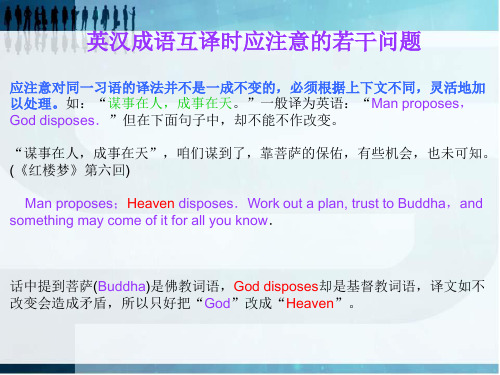
Man proposes;Heaven disposes.Work out a plan, trust to Buddha,and something may come of it for all you know.
话中提到菩萨(Buddha)是佛教词语,God disposes却是基督教词语,译文如不 改变会造成矛盾,所以只好把“God”改成“Heaven”。
英汉成语互译时应注意的若干问题
应注意对同一习语的译法并不是一成不变的,必须根据上下文不同,灵活地加 以处理。如:“谋事在人,成事在天。”一般译为英语:“Man proposes, God disposes.”但在下面句子中,却不能不作改变。 “谋事在人,成事在天”,咱们谋到了,靠菩萨的保佑,有些机会,也未可知。 (《红楼梦》第六回)
四字成语往往含义重复,在修辞上很优美匀称。但翻译时, 只要译出其中一组的意思就可以了。例如
• • • • • 花言巧语 油嘴滑舌 长嗟短叹 筋疲力尽 吞吞吐吐 fine words glib tongue sighing deeply exhaustion,exhausted stumbling,hesitating
• To wash one's hand,
• 很容易误解为“洗手不干”,其实,它却含有“断绝关系 ”,“推脱责任”的意思
翻译成语时要分辨,哪些成语含有褒义,哪些成语只用于贬 义,哪些成语褒贬两可。例如:
• • • • • • • • • • • It's an ill wind that blows nobody good。 天下无绝对的坏事。(有弊必有利。) 这句成语看起来好像是坏意,其实是好意。 Birds of a feather flock together. 物以类聚。(一丘之貉) 这句成语看起来并无贬意,其实却表示消极的意义。 To be hand and(in)glove with,(亲密无间)。 既可以用于褒 义,又可以用于贬义 The two friends are hand in glove with each other. 这两位朋友亲如手足。 The traitors and the enemy were working hand in glove with each other. 卖国贼和敌人相互勾结。
英语习语翻译中存在的问题与解决方法
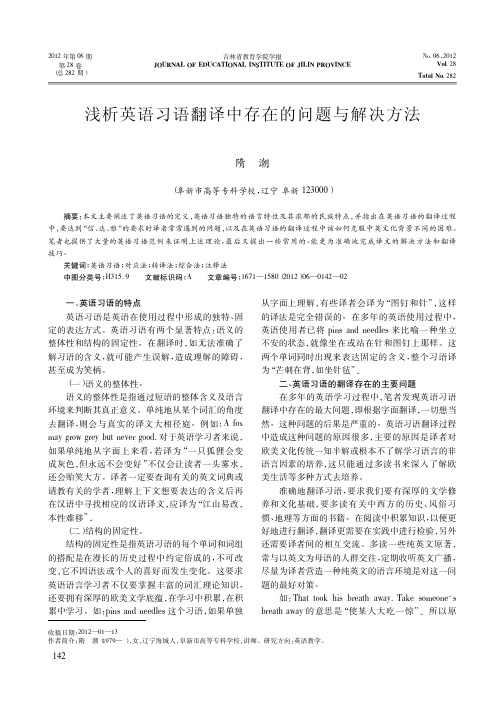
2012年第06期吉林省教育学院学报No.06,2012第28卷JOURNAL OF EDUCATIONAL INSTITUTE OF JILIN PROVINCEVol .28(总282期)Total No .282收稿日期:2012—01—13作者简介:隋潮(1979—),女,辽宁海城人,阜新市高等专科学校,讲师。
研究方向:英语教学。
浅析英语习语翻译中存在的问题与解决方法隋潮(阜新市高等专科学校,辽宁阜新123000)摘要:本文主要阐述了英语习语的定义,英语习语独特的语言特性及其浓郁的民族特点,并指出在英语习语的翻译过程中,要达到“信、达、雅”的要求时译者常常遇到的问题,以及在英语习语的翻译过程中该如何克服中英文化背景不同的困难。
笔者也提供了大量的英语习语范例来证明上述理论,最后又提出一些常用的、能更为准确地完成译文的解决方法和翻译技巧。
关键词:英语习语;对应法;转译法;综合法;注释法中图分类号:H315.9文献标识码:A文章编号:1671—1580(2012)06—0142—02一、英语习语的特点英语习语是英语在使用过程中形成的独特、固定的表达方式。
英语习语有两个显著特点:语义的整体性和结构的固定性。
在翻译时,如无法准确了解习语的含义,就可能产生误解,造成理解的障碍,甚至成为笑柄。
(一)语义的整体性。
语义的整体性是指通过短语的整体含义及语言环境来判断其真正意义。
单纯地从某个词汇的角度去翻译,则会与真实的译文大相径庭。
例如:A fox may grow grey but never good.对于英语学习者来说,如果单纯地从字面上来看,若译为“一只狐狸会变成灰色,但永远不会变好”不仅会让读者一头雾水,还会贻笑大方。
译者一定要查询有关的英文词典或请教有关的学者,理解上下文想要表达的含义后再在汉语中寻找相应的汉语译文,应译为“江山易改,本性难移”。
(二)结构的固定性。
结构的固定性是指英语习语的每个单词和词组的搭配是在漫长的历史过程中约定俗成的,不可改变,它不因语法或个人的喜好而发生变化。
英汉翻译技巧
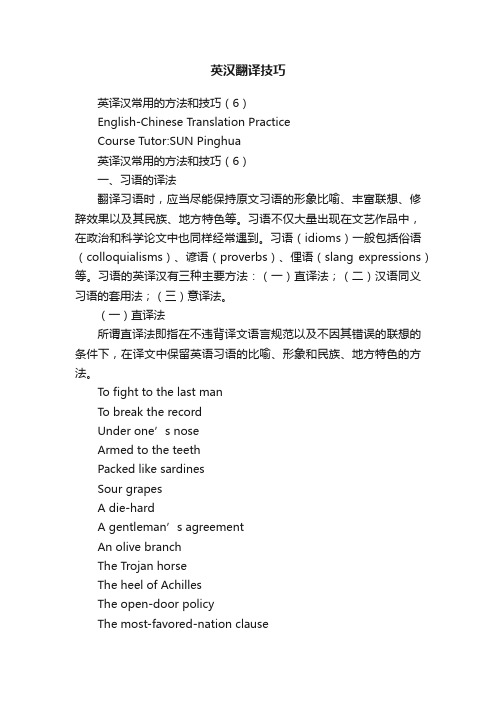
英汉翻译技巧英译汉常用的方法和技巧(6)English-Chinese Translation PracticeCourse Tutor:SUN Pinghua英译汉常用的方法和技巧(6)一、习语的译法翻译习语时,应当尽能保持原文习语的形象比喻、丰富联想、修辞效果以及其民族、地方特色等。
习语不仅大量出现在文艺作品中,在政治和科学论文中也同样经常遇到。
习语(idioms)一般包括俗语(colloquialisms)、谚语(proverbs)、俚语(slang expressions)等。
习语的英译汉有三种主要方法:(一)直译法;(二)汉语同义习语的套用法;(三)意译法。
(一)直译法所谓直译法即指在不违背译文语言规范以及不因其错误的联想的条件下,在译文中保留英语习语的比喻、形象和民族、地方特色的方法。
To fight to the last manTo break the recordUnder one’s noseArmed to the teethPacked like sardinesSour grapesA die-hardA gentleman’s agreementAn olive branchThe Trojan horseThe heel of AchillesThe open-door policyThe most-favored-nation clauseThe position-of-strength policyShuttle diplomacyThe cold warA cat has nine livesBlood is thicker than waterBarking dogs do not biteA rolling stone gathers no moss战斗到最后一个人打破记录在某人鼻子底下武装到牙齿挤得象罐头沙丁鱼酸葡萄死硬派君子协定橄榄树枝特洛伊木马阿基里斯的脚踵悬挂在达摩克里斯头顶上的剑门户开放政策最惠国条款实力地位政策穿梭外交冷战热战猫有九命血浓于水吠犬不咬人滚石不生苔(二)汉语同义习语的套用法有的英语习语和汉语同义习语在内容和形式上都相符合,双方不但有相同的意义和修辞色彩,并且有相同的或大体相同的形象比喻。
英语习语中的文化内涵及翻译时应注意的问题

知识文库 第23期207英语习语中的文化内涵及翻译时应注意的问题李玥君英语,作为当今全球的通用语言,是我们学习的主要任务之一,因为这是我们在地球村里交流的工具。
与汉语相同的是,英语中也有着一些习语,这些习语也是英语文化的特色所在。
而且这些习语不能按照通常的方法来翻译,而是有其特定的含义,正确的翻译这些习语不仅是语言严谨性的要求,也是对于西方文化的尊重。
“Bob is really a lucky dog.”鲍勃是一只幸运的狗。
若是这样翻译,怕是会被会被人笑掉大牙。
对英语有一定学习的人都应该知道,“lucky dog” 指的是幸运儿的意思。
若是翻译成为幸运的狗的话就难免存在望文生义的错误了,那为什么这么翻译呢,因为这是英语中的习语。
举个简单的例子,在中文中我们称颂一个人成就很高会用到这样的说法。
李医生是医学界的泰山北斗,我们的意思并不是指李医生是泰山北斗,而是为了突出李医生的成就很高。
这就是习语,是语言文化中代表民族特色的部分,是一个民族文化的精髓之一。
1 习语所反映的文化差异就像人体基因染色体一样将人体的特征承载传承下去,习语是一个民族的基因。
他们与文化传统紧密相连,承载了一个民族的文化传承。
这些文化的差异,来源于地理环境、历史进程、生活习俗等方面的影响。
2 英语习语在汉语文化中的对等翻译 2.1 地理方面地理对于文化的影响是非常大的。
我们都知道英国是一个岛国,在古代的历史上,英国人在航海的道路上走得更早更远。
在英语中,spend money like water 用来比喻那些花钱没有概念像流水一样的人,而汉语中我们常常用“挥金如土”来形容这种现象。
与英国发达的航海文明相对比,我国的历史上内陆的文明是相当发达的,土地的意识在名族的灵魂里根深蒂固,我们的生活繁衍离不开这片黄土地。
在英国尚未进行工业革命的时候,由于岛国的原因,英国的捕鱼业是很发达的,许多的人依靠捕鱼为生。
渐渐的,许多与鱼有关的习语也就诞生了。
英语六级中的翻译常见难点解析

英语六级中的翻译常见难点解析翻译是英语六级考试中的一项重要内容,对于许多考生来说,翻译常常是一个难点。
本文将对英语六级中的翻译常见难点进行解析,帮助考生更好地应对这一挑战。
【难点一:长难句的处理】在英语翻译中,长难句是一个常见的难点。
长难句往往由多个从句、修饰语和短语组成,结构复杂,思路繁琐。
以一种准确且流畅的方式将其翻译成中文是一项挑战。
在处理长难句时,考生应该注重理解句子的结构和语义,抓住句子的主干,并适当使用连接词和标点符号。
例如,原句:"Although the weather was bad, they still decided to go hiking in the mountains."翻译:"尽管天气不好,他们还是决定去山上徒步旅行。
"【难点二:动词短语的翻译】动词短语在英语中起着重要的作用,它们通常由动词和副词或介词构成。
翻译动词短语时,要注意保持句子的逻辑连贯性和语义准确性。
例如,原句:"He gave up smoking last year."翻译:"他去年戒烟了。
"【难点三:习语和惯用语的翻译】英语中的习语和惯用语在翻译中经常造成困扰,因为它们的含义和字面意思并不完全一样。
考生在翻译习语和惯用语时,要根据上下文和语境来确定其含义,并选择相应的表达方式。
例如,原句:"It's raining cats and dogs outside."翻译:"外面下着倾盆大雨。
"【难点四:虚拟语气的表达】虚拟语气在英语中经常用于表示假设、愿望、建议等。
在翻译虚拟语气时,考生需要注意上下文和语境,并使用合适的表达方式来传达虚拟的意义。
例如,原句:"If I were you, I would study harder."翻译:"要是我是你,我会更努力学习。
翻译笔记讲义翻译层次 习语译法口译笔译考试
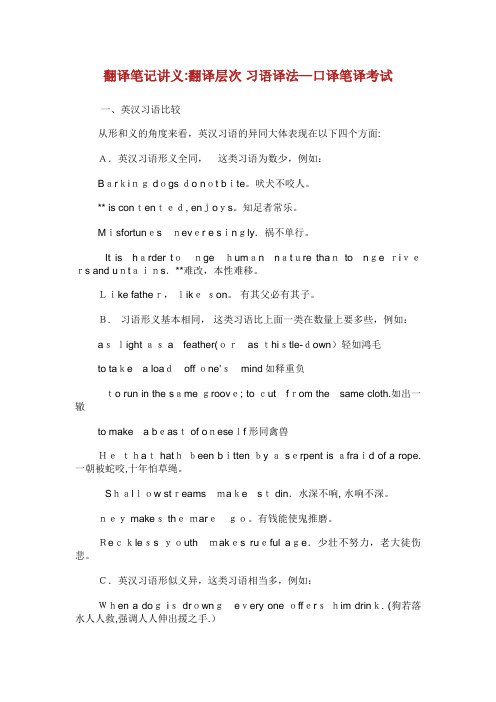
翻译笔记讲义:翻译层次习语译法—口译笔译考试一、英汉习语比较从形和义的角度来看,英汉习语的异同大体表现在以下四个方面:A.英汉习语形义全同,这类习语为数少,例如:Barking dogs do not bite。
吠犬不咬人。
** is contented, enjoys。
知足者常乐。
Misfortunesnever e singly.祸不单行。
It is harder tongehuman nature thanto nge rivers and untains.**难改,本性难移。
Like father,likeson。
有其父必有其子。
B.习语形义基本相同,这类习语比上面一类在数量上要多些,例如:aslight as a feather(oras thistle-down)轻如鸿毛to take a loadoff one'smind如释重负to run in the same groove; to cut from the same cloth.如出一辙to make a beast of oneself形同禽兽Hethat hathbeen bitten by a serpent is afraid of a rope.一朝被蛇咬,十年怕草绳。
Shallow streamsmake st din.水深不响, 水响不深。
ney makes themarego。
有钱能使鬼推磨。
Reckless youthmakes rueful age.少壮不努力,老大徒伤悲。
C.英汉习语形似义异,这类习语相当多,例如:When a dog is drowngevery one offershim drink. (狗若落水人人救,强调人人伸出援之手.)救了落水狗,反咬你一口(强调好心得不到好报)Ignorance of the law isno excuse of breakingit. (法盲犯法不可恕,强调严格执行法律.)不知者无罪(强调网开一面)Strike while the iron is hot (强调”抓住时机")趁热打铁(着重"抓紧行动”)Lock the stable-doorafter the horseis stolen。
分析英语翻译中常出现的问题及对策
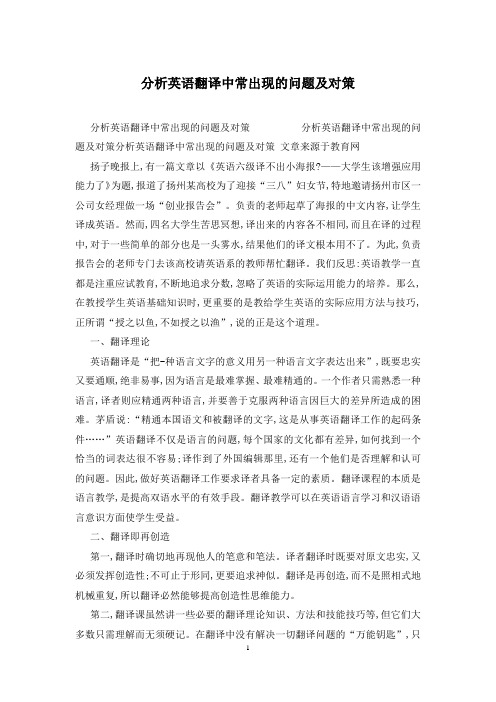
分析英语翻译中常出现的问题及对策分析英语翻译中常出现的问题及对策分析英语翻译中常出现的问题及对策分析英语翻译中常出现的问题及对策文章来源于教育网扬子晚报上,有一篇文章以《英语六级译不出小海报?——大学生该增强应用能力了》为题,报道了扬州某高校为了迎接“三八”妇女节,特地邀请扬州市区一公司女经理做一场“创业报告会”。
负责的老师起草了海报的中文内容,让学生译成英语。
然而,四名大学生苦思冥想,译出来的内容各不相同,而且在译的过程中,对于一些简单的部分也是一头雾水,结果他们的译文根本用不了。
为此,负责报告会的老师专门去该高校请英语系的教师帮忙翻译。
我们反思:英语教学一直都是注重应试教育,不断地追求分数,忽略了英语的实际运用能力的培养。
那么,在教授学生英语基础知识时,更重要的是教给学生英语的实际应用方法与技巧,正所谓“授之以鱼,不如授之以渔”,说的正是这个道理。
一、翻译理论英语翻译是“把-种语言文字的意义用另一种语言文字表达出来”,既要忠实又要通顺,绝非易事,因为语言是最难掌握、最难精通的。
一个作者只需熟悉一种语言,译者则应精通两种语言,并要善于克服两种语言因巨大的差异所造成的困难。
茅盾说:“精通本国语文和被翻译的文字,这是从事英语翻译工作的起码条件……”英语翻译不仅是语言的问题,每个国家的文化都有差异,如何找到一个恰当的词表达很不容易;译作到了外国编辑那里,还有一个他们是否理解和认可的问题。
因此,做好英语翻译工作要求译者具备一定的素质。
翻译课程的本质是语言教学,是提高双语水平的有效手段。
翻译教学可以在英语语言学习和汉语语言意识方面使学生受益。
二、翻译即再创造第一,翻译时确切地再现他人的笔意和笔法。
译者翻译时既要对原文忠实,又必须发挥创造性;不可止于形同,更要追求神似。
翻译是再创造,而不是照相式地机械重复,所以翻译必然能够提高创造性思维能力。
第二,翻译课虽然讲一些必要的翻译理论知识、方法和技能技巧等,但它们大多数只需理解而无须硬记。
英语习语翻译的原则和方法
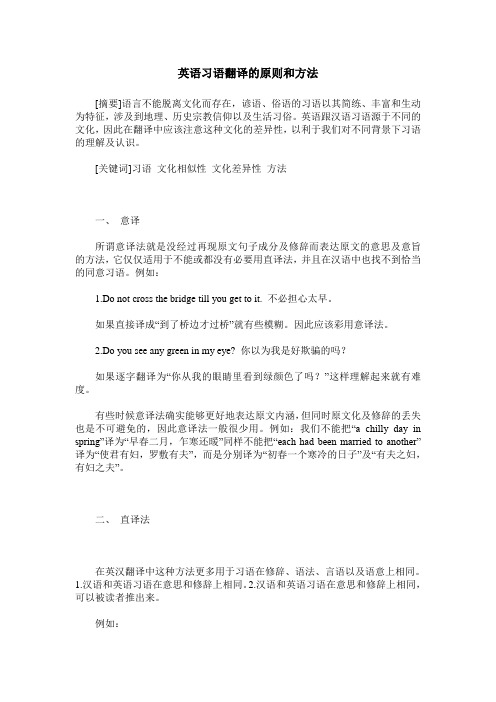
英语习语翻译的原则和方法[摘要]语言不能脱离文化而存在,谚语、俗语的习语以其简练、丰富和生动为特征,涉及到地理、历史宗教信仰以及生活习俗。
英语跟汉语习语源于不同的文化,因此在翻译中应该注意这种文化的差异性,以利于我们对不同背景下习语的理解及认识。
[关键词]习语文化相似性文化差异性方法一、意译所谓意译法就是没经过再现原文句子成分及修辞而表达原文的意思及意旨的方法,它仅仅适用于不能或都没有必要用直译法,并且在汉语中也找不到恰当的同意习语。
例如:1.Do not cross the bridge till you get to it. 不必担心太早。
如果直接译成“到了桥边才过桥”就有些模糊。
因此应该彩用意译法。
2.Do you see any green in my eye? 你以为我是好欺骗的吗?如果逐字翻译为“你从我的眼睛里看到绿颜色了吗?”这样理解起来就有难度。
有些时候意译法确实能够更好地表达原文内涵,但同时原文化及修辞的丢失也是不可避免的,因此意译法一般很少用。
例如:我们不能把“a chilly day in spring”译为“早春二月,乍寒还暖”同样不能把“each had been married to another”译为“使君有妇,罗敷有夫”,而是分别译为“初春一个寒冷的日子”及“有夫之妇,有妇之夫”。
二、直译法在英汉翻译中这种方法更多用于习语在修辞、语法、言语以及语意上相同。
1.汉语和英语习语在意思和修辞上相同。
2.汉语和英语习语在意思和修辞上相同,可以被读者推出来。
例如:1.Hitler was armed to the teeth when he launched the Second World War,but ina few years, he was completely defeated.希特勒在发动第二次世界大战时是武装到牙齿的,可是不过几年,就彻底失败了。
The idiom armed to the teeth is vivid, soon after the liberty the idiom was translated by literal translation as 武装到牙齿(如果翻译成全副武装,语气色彩就会差一些了)2.But I hated Sakamoto, and I had a feeling he would surely lead us both to our ancestors.但是我恨坂本,并预感到他肯定会领着咱们去见祖先。
如何快速准确的进行翻译资格口译笔记记录

如何快速准确的进行翻译资格口译笔记记录在翻译资格考试口译,笔记记录是非常重要的一个环节,今天小编给大家带来了如何快速准确的进行翻译资格口译笔记记录,希望可以帮助到同学们。
下面小编就和大家分享,来欣赏一下吧。
如何快速准确的进行翻译资格口译笔记记录—、口译笔记的必要性译员在进行口译工作时使用的是短时的“工作记忆”。
但是,这种短时记忆十分有限。
我们知道,口译中,如果发言人每说完一句或两句就停下来,让译员翻译,那么,就译员的短时记忆来说,完成这一两句的口译工作,是十分轻松的。
但是,在许多场合,我们常常看到,发言者为了使自己要表达的意思更加完整、连贯,或是在发言中情绪高昂的时候忘记口译员的存在,而毫无停顿地持续发言五分钟甚至上十分钟。
这种情形下,译员便很难只靠短时记忆记住说话的所有内容,尤其是当说话人突然引述了了长串数字、名称或者地名时,更是如此。
所以,对于口译员而言,能够在需要的时候,熟练地使用笔记法就显得很有必要了。
二、口译笔记的内容口译笔记切忌求“全”,记录要有所选择。
译员应该记录的是讲话的要点,把握住这些要点,译员就能够理解说话人的,图和主要意思。
通过这些要点,迅速、准确地再现讲话全貌,真正对译员起到提示作用。
总体而言,译员笔记需要记录的要点包括两个方面:信息点和信息点之间的逻辑关系。
三、口译笔记记录技巧(一)译员应该尽量使用目的语记录笔记如果不能立即想起某个字或者词,这时候如果还要继续去想,那么就会错过讲话内容,所以这时候可以先用源语来记录,留待稍后考虑如何用目的语来表达。
译员在做笔记时要记住,不是某个词怎么翻译,而是要求译员对讲话内容进行分析,以意义为主线,有意识地离开源语言,避免用源语言的思维来思考,保证译员在用目的语重新表达时,可以做到完全自如,而且符合目的语的表达习惯。
但是要求译员完全使用目的语来做笔记,可能觉得有些困难,但是译员必须从一开始学习记录口译笔记时,就要要求自己尽量使用目的语来记笔记,并养成习惯。
英汉习语比较与翻译
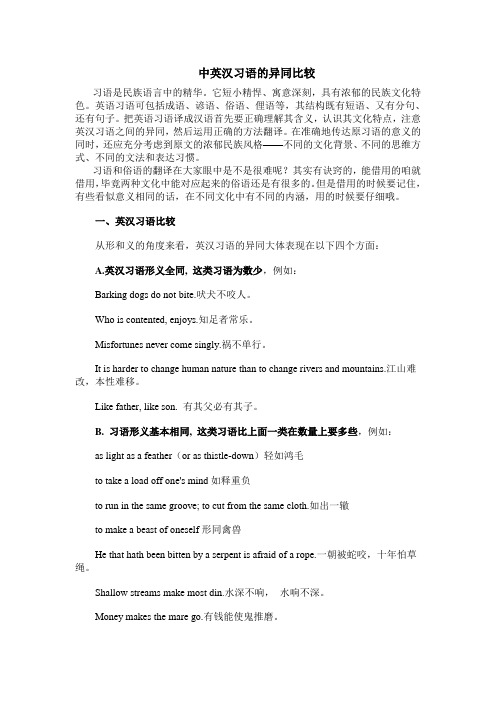
中英汉习语的异同比较习语是民族语言中的精华。
它短小精悍、寓意深刻,具有浓郁的民族文化特色。
英语习语可包括成语、谚语、俗语、俚语等,其结构既有短语、又有分句、还有句子。
把英语习语译成汉语首先要正确理解其含义,认识其文化特点,注意英汉习语之间的异同,然后运用正确的方法翻译。
在准确地传达原习语的意义的同时,还应充分考虑到原文的浓郁民族风格——不同的文化背景、不同的思维方式、不同的文法和表达习惯。
习语和俗语的翻译在大家眼中是不是很难呢?其实有诀窍的,能借用的咱就借用,毕竟两种文化中能对应起来的俗语还是有很多的。
但是借用的时候要记住,有些看似意义相同的话,在不同文化中有不同的内涵,用的时候要仔细哦。
一、英汉习语比较从形和义的角度来看,英汉习语的异同大体表现在以下四个方面:A.英汉习语形义全同, 这类习语为数少,例如:Barking dogs do not bite.吠犬不咬人。
Who is contented, enjoys.知足者常乐。
Misfortunes never come singly.祸不单行。
It is harder to change human nature than to change rivers and mountains.江山难改,本性难移。
Like father, like son. 有其父必有其子。
B. 习语形义基本相同, 这类习语比上面一类在数量上要多些,例如:as light as a feather(or as thistle-down)轻如鸿毛to take a load off one's mind如释重负to run in the same groove; to cut from the same cloth.如出一辙to make a beast of oneself形同禽兽He that hath been bitten by a serpent is afraid of a rope.一朝被蛇咬,十年怕草绳。
中英习语的翻译

(1)趁热打铁 (2)浑水摸鱼 (3)火上浇油 (4)祸不单行
D. 意译
•
当直译原文结果会令人为费解或造 成误解时,如使用套译的结果不理 想,还可以采用意译。例如:
•
• Look at the chaps in politics and business, whose whole lives were passed in skating on thin ice, and getting knighted for it. • 试看那些政治上和商业上的家伙们, 他们整个儿的生活都是在风险中度过 的,可是都因此封了爵。(to skate on thin ice 若直译为"如履薄冰",则 会产生谨慎从事的联想, 有违原意。)
直译法练习
:
• 1)A rolling stone gathers no moss. • (2)Knowledge is power. • (3)The cold war
• (1) 滚石不生苔 • (2) 知识 就是力量 • (3) 冷战
B. 直译加注法 有些习语直译后, 仍不能把原 意清楚准确地表达出来, 就可采 用直译加注释法。例如: • a bull in a china shop • 公牛闯进瓷器店──肆意捣乱
• as red as rose 艳如桃李 • as clear as daylight 洞若观火 • All shall be well, Jack shall have Jill. 有情人 终成眷属。 • He robs Peter to pay Paul. 拆东墙补西墙。 • Diamonds cut Diamonds. 棋逢对手,将遇良 才。 • Pay on the spot and borrow a lot; pay slow and you’ll get no dough. • 好借好还,再借不难。
英语习语的理解与翻译
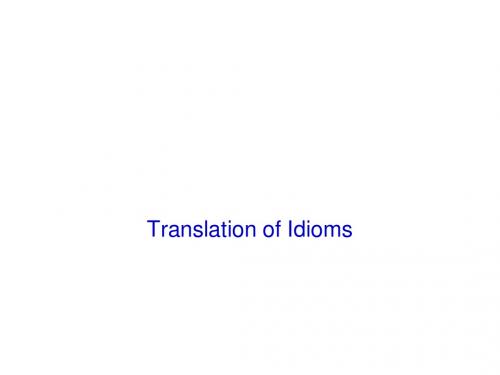
Translation of Idioms
• 在语言的发展过程中,人们经过长期的社会实践 提炼出一些固定的短语或短句,这就是习语,也 是语言的精华,是人们智慧的结晶。 • 英语习语从广义上讲,包括俗语 (colloquialism)、谚语(proverb)、俚语 (slang expression)等。
• 习语大多短小精悍、言简意赅、生动形象、通俗 意懂,是广大人民所喜闻乐见的一种形象化的语 言,不仅具有浓郁的民族和地方色彩,还集中体 现了语言中的各种修辞手法。因此在翻译习语时, 除了要忠实地表达出原文的含义外,还应该尽可 能地保留原文的丰富联想、形象比喻以及地方色 彩等。 • 英语的习语翻译通常采用四种方法:直译法、直 译加注法、套译法和意译法。
• 五、英语习语翻译中值得注意的问题
• 英语习语的译文并不是唯一的。 英语习语的译文并不是唯一的。 • 英汉两种语言的习语中有许多带有浓厚的民族色 或者包含某些人名和地名, 彩,或者包含某些人名和地名,这些习语在英汉 两种语言中通常是不能互相替换的。 两种语言中通常是不能互相替换的。 • 英语习语的翻译不可望文生义。 英语习语的翻译不可望文生义。 • 准确理解英语习语,弄清褒贬之分。 准确理解英语习语,弄清褒贬之分。
• 一、直译法
• • • • • 采用直译的习语多半是英语和汉语在比喻和形 象方面基本相同的 to add fuel to the flames 火上加油 to be on thin ice 如履薄冰 walls have ears 隔墙有耳 a stony heart 铁石心肠
• 二、直译加注法 • 有些习语还含有比喻意义、象征意义或历史典故 等,在翻译的时候一般要在其后加注进行解释。 • Crocodile tears 鳄鱼的眼泪(假慈 悲) • The tower of ivory 象牙塔(脱离现实 的小天地) • Waterloo 滑铁卢(惨败的事件) • Wolf in sheep’s clothing 披着羊皮的狼 (伪善的敌人)
论习语的翻译
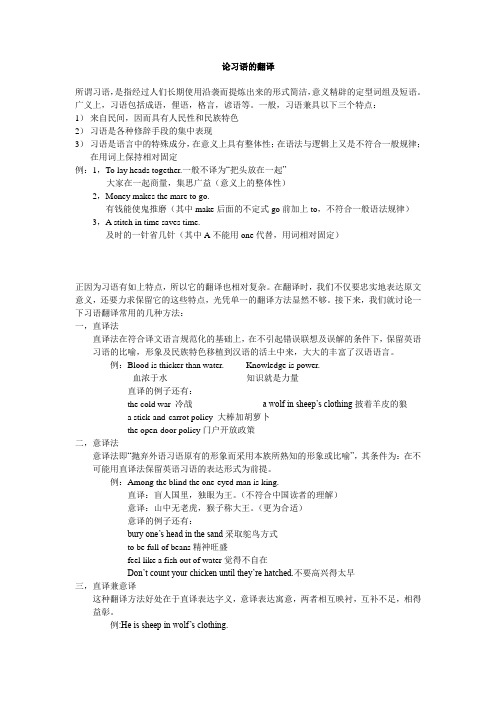
论习语的翻译所谓习语,是指经过人们长期使用沿袭而提炼出来的形式简洁,意义精辟的定型词组及短语。
广义上,习语包括成语,俚语,格言,谚语等。
一般,习语兼具以下三个特点:1)来自民间,因而具有人民性和民族特色2)习语是各种修辞手段的集中表现3)习语是语言中的特殊成分,在意义上具有整体性;在语法与逻辑上又是不符合一般规律;在用词上保持相对固定例:1,To lay heads together.一般不译为“把头放在一起”大家在一起商量,集思广益(意义上的整体性)2,Money makes the mare to go.有钱能使鬼推磨(其中make后面的不定式go前加上to,不符合一般语法规律)3,A stitch in time saves time.及时的一针省几针(其中A不能用one代替,用词相对固定)正因为习语有如上特点,所以它的翻译也相对复杂。
在翻译时,我们不仅要忠实地表达原文意义,还要力求保留它的这些特点,光凭单一的翻译方法显然不够。
接下来,我们就讨论一下习语翻译常用的几种方法:一,直译法直译法在符合译文语言规范化的基础上,在不引起错误联想及误解的条件下,保留英语习语的比喻,形象及民族特色移植到汉语的活土中来,大大的丰富了汉语语言。
例:Blood is thicker than water. Knowledge is power.血浓于水知识就是力量直译的例子还有:the cold war 冷战 a wolf in sheep’s clothing披着羊皮的狼a stick-and-carrot policy 大棒加胡萝卜the open-door policy门户开放政策二,意译法意译法即“抛弃外语习语原有的形象而采用本族所熟知的形象或比喻”,其条件为:在不可能用直译法保留英语习语的表达形式为前提。
例:Among the blind the one-eyed man is king.直译:盲人国里,独眼为王。
- 1、下载文档前请自行甄别文档内容的完整性,平台不提供额外的编辑、内容补充、找答案等附加服务。
- 2、"仅部分预览"的文档,不可在线预览部分如存在完整性等问题,可反馈申请退款(可完整预览的文档不适用该条件!)。
- 3、如文档侵犯您的权益,请联系客服反馈,我们会尽快为您处理(人工客服工作时间:9:00-18:30)。
翻译英语习语应注意的几个问题A. 准确理解习语,切毋望文生义,弄出笑话来。
例如下面几例就是因为理解错了,所以译文不对:(1)John likes to pat himself on the back. 约翰喜欢捶自己的背。
(正确译法:约翰喜欢自吹。
)(2)Then it happened that I had to answer the call of nature, and, passing, I saw the risen dough, which seemed to say to me, "Do it!" In brief, I let myself be persuaded. 碰巧我现在得对自然的召唤作出答复(正确译法:碰巧这时我想解手),走着,我看到了发起来的面团,它好象对我说,"撒吧!"简单地说,我真的这么做了。
(3)He kissed the hare's foot. 他吻了兔子的脚。
(正确译法:他迟到了。
)有时,一些貌似有理据或合乎逻辑的习语极易导致人们相信自己直觉而疏于查考,单从字面或比喻意义去联想,造成理解以至表达的错误。
这就要求译者不能马虎,不能望文生义,而需殚精竭虑,采取细针密缕的态度。
例如: There is no love lost between them.很容易被理解成"他们彼此恩爱,感情从未破裂",而实际意思却是"他们互相憎恨,毫无爱情可言。
" 类似的例子还有:(1) It is a good horse that never stumbles.好马也有失蹄时。
(不宜译成"良马不失蹄")(2) It is a good man that never stumbles, and a good wife that never grumbles. 好丈夫也有过失,好妻子也会唠叨。
(不宜译成"从不失足的丈夫是好丈夫,从不唠叨的妻子是好妻子")(3)It is an ill bird that fouls its own nest. 再坏的鸟也不至于弄脏自己的窝。
(不宜译成"弄脏自己的窝的是坏鸟雀".)(4) Time and tide wait for no man. 时光如潮水,不等任何人。
(不宜译为"时光和潮水不等人".)(5) Of soup and love, the first is the best.恋爱如喝汤,头一碗最香。
(不宜译?quot;头一次喝汤恋爱最好".)(6)In choosing a wife and buying a sword we ought not to trust another. 择妻如选剑,不能靠别人。
(不宜译为 "择妻和选剑不能靠别人。
")(7) There was never a night or a problem that could defeat sunrise or hope. 黑夜不能阻止日出,难题无法抹杀希望。
(不宜译为 "黑夜和难题无法击败日出和希望")(8) People will be long forgetting her.人们会长久记住她的。
(不宜译为 "人们在很长时间内会忘记她".)B. 采用套译法时,要特别注意避免使用民族特色太浓的汉语成语来套译英语习语,否则译文在上下文中就会显得不伦不类,损及原意。
例如:(1) Beauty lies in lover's eyes.情人眼里出美人。
(不宜译作"情人眼里出西施".)(2) Many heads are better than one. 一人不及众人计。
(不宜译作"三个臭皮匠,顶个诸葛亮(3)Never offer to teach fish to swim.不要教鱼儿游泳。
(不宜译作"不要班门弄斧".)(4) Even a worm will turn. 逼人入绝境,绵羊也反抗(不宜译作"狗急跳墙".)(5)Give a dog a bad (an ill) name and hang him. 谗言可畏(不宜译为"欲加之罪,何患无辞",其本意是指"一旦给人加个坏名声,他就很难洗刷掉了".)(6) Lock the stable door when the horse has been stolen.贼去关门。
(不宜译作"亡羊补牢",其原意是"马盗锁厩门,为时已太晚".)(7) A miss is as good as a mile. 错无大小,其错一样。
(不宜译作"失之毫厘,谬以千里(8) have the face 恬不知耻,厚脸皮(不是有面子)(9) to pull somebody's leg 开玩笑(不是拖后腿)(10) a big fish in a small pond 山中无老虎,猴子也称王。
(或:林中无鸟雀称王。
不是 "小塘容不下大鱼".)C.有些习语有多种译法,哪种译法恰当要视具体语境而定: (1)Take care of the pence, and the pounds will take care of themselves. (金钱)积少自然成多。
/小事谨慎,大事自成。
(2)One swallow does not make a summer. 一燕不成夏。
/轻率推论必成大错。
/一关渡过并非万事大吉。
(3) Still water runs deep. 静水流深。
/外表淡漠然而内心深情。
/沉默者深谋。
(4)Don't cross the bridge till you get to it.到了桥边才过桥。
/不必担心太早。
/不必自寻烦恼。
(5)He laughs best who laughs last.谁笑在最后,谁笑得最好(鼓励)。
/不要高兴得太早(警告)。
(6)Don't cast out the foul water till you bring in the clean.清水未来,莫泼脏水。
/新的不来,旧的莫丢。
1.爱屋及乌Love me, love my dog.2.百闻不如一见Seeing is believing.3.比上不足比下有余worse off than some, better off than many; to fall short of the best, but be better than the worst.4.笨鸟先飞A slow sparrow should make an early start.5.不眠之夜white night6.不以物喜不以己悲not pleased by external gains, not saddened by personnal losses7.不遗余力spare no effort; go all out; do one's best8.不打不成交No discord, no concord.9.拆东墙补西墙rob Peter to pay Paul10.辞旧迎新bid farewell to the old and usher in the new; ring out the old year and ring in the new11.大事化小小事化了try first to make their mistake sound less serious and then to reduce it to nothing at all12.大开眼界open one's eyes; broaden one's horizon; be an eye-opener13.国泰民安The country flourishes and people live in peace14.过犹不及going too far is as bad as not going far enough; beyond is as wrong as falling short; too much is as bad as too little15.功夫不负有心人Everything comes to him who waits.16.好了伤疤忘了疼once on shore, one prays no more17.好事不出门恶事传千里Good news never goes beyond the gate, while bad news spread far and wide.18.和气生财Harmony brings wealth.19.活到老学到老One is never too old to learn.20.既往不咎let bygones be bygones21.金无足赤人无完人Gold can't be pure and man can't be perfect.22.金玉满堂Treasures fill the home.23.脚踏实地be down-to-earth24.脚踩两只船sit on the fence25.君子之交淡如水the friendship between gentlemen is as pure as crystal; a hedge between keeps friendship green26.老生常谈陈词滥调cut and dried, cliché27.礼尚往来Courtesy calls for reciprocity.28.留得青山在不怕没柴烧Where there is life, there is hope.29.马到成功achieve immediate victory; win instant success30.名利双收gain in both fame and wealth31.茅塞顿开be suddenly enlightened32.没有规矩不成方圆Nothing can be accomplished without norms or standards.33.每逢佳节倍思亲On festive occasions more than ever one thinks of one's dear ones far away.It is on the festival occasions when one misses his dear most. 34.谋事在人成事在天The planning lies with man, the outcome with Heaven. Man proposes, God disposes.35.弄巧成拙be too smart by half; Cunning outwits itself36.拿手好戏masterpiece37.赔了夫人又折兵throw good money after bad38.抛砖引玉a modest spur to induce others to come forward with valuable contributions; throw a sprat to catch a whale39.破釜沉舟cut off all means of retreat;burn one‘s own way of retreat and be determined to fight to the end40.抢得先机take the preemptive opportunities41.巧妇难为无米之炊If you have no hand you can't make a fist. One can't make bricks without straw.42.千里之行始于足下 a thousand-li journey begins with the first step--the highest eminence is to be gained step by step43.前事不忘后事之师Past experience, if not forgotten, is a guide for the future. 44.前人栽树后人乘凉One generation plants the trees in whose shade another generation rests.One sows and another reaps.45.前怕狼后怕虎fear the wolf in front and the tiger behind hesitate in doing something46.强龙难压地头蛇Even a dragon (from the outside) finds it hard to control a snake in its old haunt - Powerful outsiders can hardly afford to neglect local bullies.47.强强联手win-win co-operation48.瑞雪兆丰年A timely snow promises a good harvest.49.人之初性本善Man's nature at birth is good.50.人逢喜事精神爽Joy puts heart into a man.51.人海战术huge-crowd strategy52.世上无难事只要肯攀登Where there is a will, there is a way.53.世外桃源a fictitious land of peace away from the turmoil of the world;54.死而后已until my heart stops beating55.岁岁平安Peace all year round.56.上有天堂下有苏杭Just as there is paradise in heaven, ther are Suzhou and Hangzhou on earth57.塞翁失马焉知非福Misfortune may be an actual blessing.58.三十而立A man should be independent at the age of thirty.At thirty, a man should be able to think for himself.59.升级换代updating and upgrading (of products)60.四十不惑Life begins at forty.61.谁言寸草心报得三春晖Such kindness of warm sun, can't be repaid by grass. 62.水涨船高When the river rises, the boat floats high.63.时不我待Time and tide wait for no man.64.杀鸡用牛刀break a butterfly on the wheel65.实事求是seek truth from facts; be practical and realistic; be true to facts66.说曹操,曹操到Talk of the devil and he comes.67.实话实说speak the plain truth; call a spade a spade; tell it as it is68.实践是检验真理的唯一标准Practice is the sole criterion for testing truth.69.山不在高,有仙则名'No matter how high the mountain is, its name will spread far and wide if there is a fairy; '70.韬光养晦hide one's capacities and bide one's time71.糖衣炮弹sugar-coated bullets72.天有不测风云Anything unexpected may happen. a bolt from the blue73.团结就是力量Unity is strength.74.“跳进黄河洗不清”'eve if one jumped into the Yellow River, one can not wash oneself clean--there's nothing one can do to clear one's name '75.歪风邪气unhealthy practices and evil phenomena76.物以类聚,人以群分Birds of a feather flock together.77.往事如风'The past has vanished (from memory) like wind.; What in past, is pas78.望子成龙hold high hopes for one's child79.屋漏又逢连阴雨Misfortunes never come singly. When it rains it pours.80.文韬武略military expertise; military strategy81.唯利是图draw water to one's mill82.无源之水,无本之木water without a source, and a tree wiithout roots83.无中生有make create something out of nothing84.无风不起浪There are no waves without wind. There's no smoke without fire. 85.徇私枉法bend the law for the benefit of relatives or friends 86.新官上任三把火a new broom sweeps clean87.虚心使人进步,骄傲使人落后Modesty helps one go forward, whereas conceit makes one lag behind.88. 蓄势而发accumulate strength for a take-off89.心想事成May all your wish come true90.心照不宣have a tacit understanding; give tacit consent; tacit understanding 91.先入为主First impressions are firmly entrenched.92.先下手为强catch the ball before the bound93.像热锅上的蚂蚁like an ant on a hot pan94.现身说法warn people by taking oneself as an example95.息事宁人pour oil on troubled waters96.喜忧参半mingled hope and fear97.循序渐进step by step98.一路平安,一路顺风speed somebody on their way; speed the parting guest99.严以律己,宽以待人be strict with oneself and lenient towards others 100鱼米之乡101.有情人终成眷属'Jack shall have Jill, all shall be well.' 102.有钱能使鬼推磨Money makes the mare go. Money talks. 103. 有识之士people of vision 104.有勇无谋use brawn rather than brain 105.有缘千里来相会Separated as we are thousands of miles apart, we come together as if by predestination.106.与时俱进advance with times107.以人为本people oriented; people foremost 108.因材施教teach students according to their aptitude 109.欲穷千里目,更上一层楼'to ascend another storey to see a thousand miles further; Ascend further, were you to look farther; Would eye embrace a thousand miles? Go up, one flight.' a land of milk and honey110.欲速则不达Haste does not bring success. 111. 优胜劣汰survival of the fittest112.英雄所见略同Great minds think alike.113.冤家宜解不宜结Better make friends than make enemies. 114.冤假错案'cases in which people were unjustly, falsely or wrongly charged or sentenced; unjust, false or wrongcases'115.一言既出,驷马难追A real man never goes back on his words. 116.招财进宝Money and treasures will be plentiful 117.债台高筑become debt-ridden118.致命要害Achilles' heel119. 众矢之的target of public criticism120.知己知彼,百战不殆Know the enemy and know yourself, and you can fight a hundred battles with no danger of defeat.121. 纸上谈兵be an armchair strategist122.纸包不住火Truth will come to light sooner or later. 123.左右为难between the devil and the deep blue sea。
